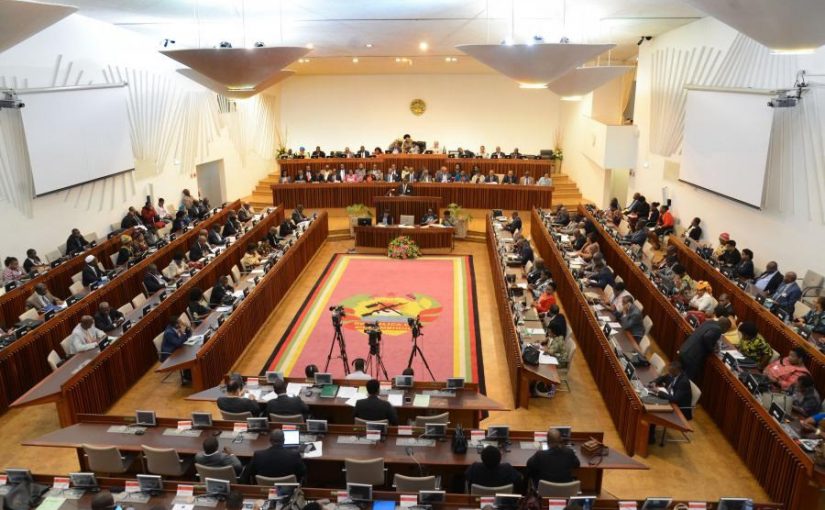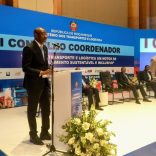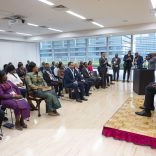Mozambique: President appoints new rectors to public universities
Differing views of municipal elections in parliament

File photo
Dramatically different interpretations of last week’s municipal elections were on display on Thursday at the formal opening session of the end-of-year sitting of the Mozambican parliament, the Assembly of the Republic.
The head of the parliamentary group of the ruling Frelimo Party, Margarida Talapa, claimed that the elections were “free, fair and transparent”, while her opposite number in the main opposition party, Renamo, Ivone Soares declared the “enormous irregularities” meant there was no way the elections could be described as free or credible.
Talapa said “we witnessed orderly, free and enthusiastic municipal elections, demonstrating commitment to the consolidation of democracy”, but Soares pointed to incidents of police violence, an alleged assassination attempt against the Renamo mayoral candidate in the western city of Tete, Ricardo Tomas, and attempts to prevent Renamo from campaigning in parts of Gaza, Maputo and Tete provinces.
Talapa passed over in silence the violent incidents mentioned by Soares and did not mention the Renamo claims of fraud in several municipalities.
She said the municipal voters had trusted in Frelimo, and gave it a victory which ensured the party would continue to run the majority of the municipalities.
This is true, in that the “intermediate results” declared over the past weekend, put Frelimo in control of 44 municipalities, Renamo of eight, and the Mozambique Democratic Movement (MDM) of one. But the Frelimo victory in several municipalities is being challenged, and there are credible accusations of fraud in at least four (Maxixe, Alto Molocue, Monapo and Marromeu).
The results have yet to be confirmed by the National Elections Commission (CNE), and validated by the Constitutional Council, the country’s highest body in matters of constitutional and electoral law. Even if the Frelimo victory is confirmed in all 44 municipalities, its majority is slim, at only 51.95 per cent of valid votes.
Talapa urged all political parties and the public at large “to wait peacefully for the validation and publication of the definitive results”.
She praised President Filipe Nyusi for the agreement he has reached with Renamo on the disarming and demobilisation of the Renamo militia, and hoped that the Renamo leadership “will be true to its word and the commitments given, and will lay down its guns definitively”.
She believed that the international mediators in the demilitarisation of Renamo “will provide a dynamic that ensures this process is fruitful and allows all of Renamo’s residual armed men the opportunity to rejoin society as genuinely free men, benefitting from all the rights, freedoms and guarantees envisaged in the law”.
Soares declared that the local elections “prove that Frelimo is finished and is imploding. Renamo is the future. Renamo is the hope”.
Unlike the interim coordinator of the Renamo Political Commission, Ossufo Momade, who had threatened to end the talks on demilitarisation because of the alleged election frauds, Soares showed no interest in abandoning negotiations.
“Unlike Frelimo, Renamo does not need guns to win elections, we have the people on our side”, she said. “The vote for Renamo is a sign the people want Renamo in power. The will of the people must be respected. Renamo will govern”.
Soares said that demilitarisation should go alongside “depoliticising” the state, and ensuring the independence of such bodies as the Attorney-General’s Office (PGR). She wanted to see an independent Attorney-General who would prosecute those responsible for the illegal debts “which have driven Mozambique into bankruptcy”.
“There must be an end to impunity”, she declared. “For how long will Mozambique be the hostage of mafia groups who control the state”.
She was confident that Renamo will win the presidential and parliamentary elections scheduled for next year. Then impunity would end “and Mozambique will change”.
Lutero Simango, head of the MDM parliamentary group, took a lower key approach, stressing that the MDM had managed to hold onto the jewel in its crown, the central city of Beira. It had lost the other three municipalities it had once controlled, but was sure that in those three cities (Nampula, Quelimane and Gurue) “it will be difficult to wipe out the marks left by the MDM”.
Unlike Soares, Simango did not claim that generalised fraud had occurred – however, he believed that, before and during the election period, attempts had been made to discredit the MDM in the press, “and incursions of a political nature were made to destabilise the functional structure of the MDM”.
He did not elaborate, but he was clearly referring to Renamo’s successful drive to poach key figures from the MDM – the most significant MDM cadres to defect to Renamo were the mayor of Quelimane, Manuel de Araujo, the man the MDM had intended to run as mayoral candidate in Maputo, Venancio Mondlane, and MDM parliamentarians Ricardo Tomas and Geraldo de Carvalho.
But “the tough victory won in Beira is a clear and indisputable demonstration that the backbone of the MDM has not been destroyed”, said Simango.












Leave a Reply
Be the First to Comment!
You must be logged in to post a comment.
You must be logged in to post a comment.